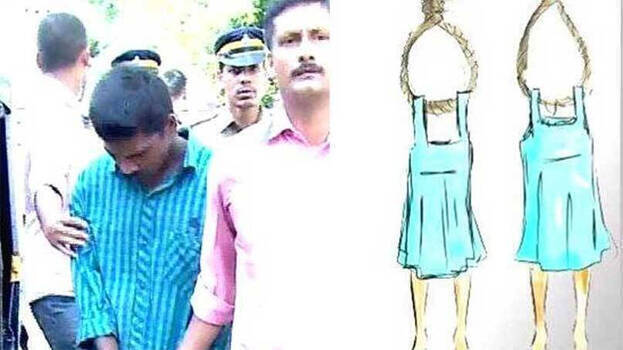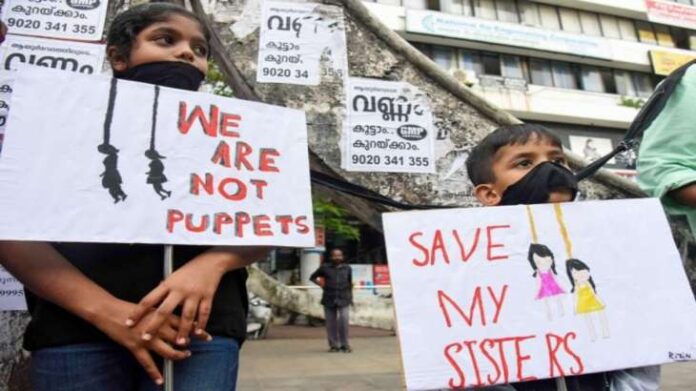Background of the Wayalar Sister Case
In January 2017 a 13-year-old was found dead in the house, where she was putting up with her parents and sister in Wayalar, Palakkad district of Kerala. Almost two months later, her sister, who was nine years old, was also found dead in March at the same house. Both the cases were registered in the Walayar police station under Section 174 of Code of Criminal Procedure (CrPC) and a case of unnatural death.
Both sisters, belonging to the Scheduled Caste community, were found hanging in their house. The two consecutive deaths made the people of Walayar protest as they took the streets. They demanded to add the provisions of rape and assault.The post-mortem report of the younger sister by a senior surgeon and expert in forensic medicine, Dr PB Gujaral revealed that she was subjected to sexual assault.
The autopsy report even suggested the possibility of homicidal hanging, which was later done away by the Court on Walayar sister’s case for lack of evidence. Then, the police had to re-visit the reports of the elder sister, which also suggested sexual assaulted, earlier overlooked by the police. The post mortem report of the elder sister was prepared by one Dr Priyatha V, where the reason for death was mentioned ‘by hanging’.
Furthermore, the report revealed no mention of injury on genitals but had stated that ‘anal orifice appeared stretched with multiple mucosal erosions at margins with pustular areas at places’. Despite apparent deposition of the doctor to the police and later in the Court, the police overlooked the possibility of a Walayar rape case.
The doctor clearly stated ‘that the tears or abrasions and pus collection could have been because of anal penetration, or a result of an infection in the region or piles in the region’, as reported by The News Minute. For the younger sister, the angle of homicidal hanging, as suggested by the autopsy report was ignored by the police.

Five accused, including one juvenile arrested:
After that, in a few days five people namely V Madhu, M Madhu, Shibu and Pradeep Kuma, including one juvenile was arrested alleging rape, unnatural sex, sexual assault as well as abetment of suicide. Therefore, the accused were charged with Section 376 of the Indian Penal Code for rape, 377 (unnatural offences), 305 (abetment to suicide of child or insane person), and 354 (assault or use of criminal force to women with intent to outrage her modesty). The police had also invoked various provisions of the Protection of Children from Sexual Offices Act and the Scheduled Castes and Scheduled Tribes (Prevention of Atrocities) Act.
The case of the prosecution suggests that the two minor girls, who were sisters aged 13 and 9 respectively, were repeatedly subjected to unnatural sexual intercourse. The intolerable sexual assault and harassment by the accused led to the girls committing suicide.
All accused have been acquitted:
A recent development in the case, the First Additional Sessions Judge of a Special POCSO court has acquitted all the accused in the case. One Pradeep Kumar was acquitted last year in September, and the rest three have been acquitted recently in October 2019. This has again led to massive outrage complaining that the investigation was ‘deliberately sabotaged’. Moreover, Advocate N Rajesh, who was the former Chairman of the Child Welfare Committee [CWC], was appointed to appear in the case for the accused.
During the pendency of the trial, Advocate N Rajesh was in office, and it is believed that it was only after his appointment as the Chairman of the CWC that he relinquished the brief of the accused in the said matter. Following the furore, Rajesh was removed as the CWC chairman.
Investigative lapses leading to injustice to the Walayar Sisters:
On October 28 (Monday), the case was brought up in the Kerala Legislative Assembly where the opposition was highlighting the lapses in investigation and prosecution. In response, the Chief Minister of Kerala, Pinarayi Vijayan has promised in the floor of the assembly that the government will examine if there are any such lapses and will decide on the need for a re-investigation or CBI probe if required. She has suggested that the government will take this matter to appeal to seek the services of an experienced lawyer.
The reason behind the acquittal, as gathered from an earlier judgment of September 30 acquitting Pradeep Kumar and three other in October reveals lack of evidence to further prosecute in the said matter. Justice Muralee Krishna S., 1st Additional Sessions Judge, Palakkad, in the judgment acquitting Pradeep Kumar

“I have no hesitation in holding that the prosecution has miserably failed to prove the alleged offences against the accused beyond a reasonable doubt.”
Therefore, the case, as brought before the Court was based entirely on circumstantial evidence. All pieces of evidence brought on record by the police, suggest no other manner for the death of these girls but by suicide, said the Court. Moreover, there was no direct evidence suggesting that Pradeep Kumar, living on a mere distance of 100 meters from the family, was involved in subjecting any of the girls to sexual abuse. The relation between the elder girl and Pradeep Kumar is that he used to give her tuition classes at his home.
Moreover, three women appearing as witnesses for the prosecution deposed before the Court that the elder sister had confessed earlier that Pradeep had exhibited his nudity before her. They also stated that the elder sister used to become scared and perplexed on encountering Pradeep anywhere on the streets.
One of these three women also revealed that the elder sister once confided in her saying that the accused had locked her in a room and forced her to click nude pictures of him from his mobile phones. But the same could not be corroborated from the statement she had earlier given under Section 161 CrPC; treating the omission as a material contradiction. This attracted looking into previous jurisprudence, where the Court relied on the precedent set in Subhash v. State of Haryana. It stated as follows:
“a significant omission made by a witness in the statement given to police under Section 161 can amount to a contradiction.”
However, the statements of the prosecution witnesses were disbelieved, doubting their genuineness, as they contradicted in the timing of the girl’s statements. Worsening the case of the prosecution, two of the three women also turned hostile later. These witnesses were then declared as ‘planted witnesses’, trying to help the case of the prosecution.
Throughout the said proceedings, the parents of the girl made no statement as against Pradeep Kumar alleging him to have sexually assaulted her. However, as against another accused V Madhu, the father deposed before the Court he had seen her once sexually assaulting her elder daughter.

Furthermore, the judgment also focuses on the lack of scientific evidence in the case of both the sisters. Evidence on record did not disclose any semen or spermatozoa either from the specimen collected from the deceased girl or from the dresses of the accused. This resulted in no tangible scientific link between the accused and the alleged offence of sexual abuse.
In fact, there is the presence of other factors which incline in favour of acquittal of the accused. The statement as given by the doctor who prepared the post mortem report of the elder sister, Dr Priyatha who is also a forensic surgeon reveals that anal injuries of the girl could be due to piles infection. In the presence of the above-mentioned factors, the Court has ordered an acquittal for the lack of conclusive proof of any anal penetration of the girl.
Therefore, in this case, there is an absence of substantive evidence to be corroborated by the opinion evidence given by the doctor. Moreover, the deposition of the doctor shows an alternative opinion of infection in the anal region of the girl was also provided by this expert, which cannot be completely ruled out.
An appeal will be preferred: DG, Kerala
After much hue and cry, the Director-General of Kerala, Manjerai Shreedharan Nair has said that the case of Walayar sisters will go into an appeal, seeking a re-trial into the matter. She has also said that there are chances of a fresh investigation as well. However, as per the present legal framework, re-probe into the charges from which there is either conviction or acquittal is forbidden by the law as under Article 20(2) of the Indian Constitution and Section 300 of the Criminal Procedure Code imbibing the doctrine of Double Jeopardy.
So legally, the only option remaining is to try the accused for charges of murder, which were not framed earlier. Another way to go about the acquittal could be to move either the High Court or the Supreme Court praying to quash the earlier trial and investigation.
Summons to be issued by NCSC to Chief Secretary & State Police Chief:
After the weak case of the prosecution being revealed by the judgments, the National Commission for Scheduled Case [NCSC] has said that it will summon the Chief Secretary of Kerala as well as the state police chief, in order to get more details in the manner in which the case of the Walayar sisters was handled.
The announcement was made when L Murugan, the vice-chairman of the NCSC, visited the home of the two sisters to meet their parents. After the said meeting, he has revealed that the public prosecutor has done a poor job as it did not coordinate with the mother of the victims. Murugan said:
“The police never did a proper probe, and there was no coordination at all with the mother of the kids. Hence both the Chief Secretary and the DGP will be summoned,”
The state police chief, Mr Lokanath Behara said they are awaiting the order of acquittal as passed by the Court. He has assured the media that after a perusal of the order, he shall surely take ‘strict action’ on the matter if any lapses in the investigation are disclosed. He has said that as the case involved two young children, it should be viewed seriously and that it is ‘an emotional matter.’

